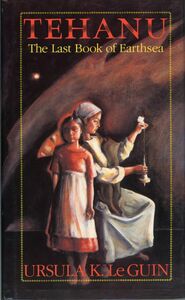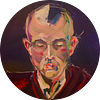Take a photo of a barcode or cover
emotional
reflective
fast-paced
Plot or Character Driven:
A mix
Strong character development:
Yes
Loveable characters:
Yes
My least favourite so far. The third act felt rushed. Outside of that, I felt it as meditative and profound in the quiet moments as the rest of them. This book really benefits from it afterword
adventurous
emotional
tense
medium-paced
Plot or Character Driven:
Character
Strong character development:
Complicated
Loveable characters:
Yes
Diverse cast of characters:
Yes
Flaws of characters a main focus:
No
Have you listened to King by Florence + the Machine? She gets it.
No tengo palabras suficientes para explicar cuánto amo este libro. Mil estrellas. La que más brilla es Tehanu.
adventurous
dark
sad
medium-paced
Plot or Character Driven:
A mix
Strong character development:
Yes
Loveable characters:
Yes
Diverse cast of characters:
Yes
Flaws of characters a main focus:
No
My feelings about this book are really complicated. This is easily my least favorite Earthsea book even though I fully understand what le Guin was going for with almost every decision. I like the concepts she's thrown in -- the idea of following the lesser known sides of the world, particularly those lacking magic and the traditionally underrepresented roles in fiction -- but I just think that the execution falls flat. I love the idea of Tenar and Ged having to grapple with these issues being thrown at them, but ultimately the story feels like it never gets anywhere actually interesting.
Also, apparently I'm in the minority here, but I absolutely HATE the idea of Ged and Tenar getting together romantically. I understand that their relationship has changed over the past 25 years, but it feels like such a disservice to both of their characters that they actually have been in love with each other this whole time. One thing about Tombs of Atuan that I adored is the fact that, contrary to the trope, the main man and woman don't end up together and their relationship, while being incredibly deep and intricate, almost transcends romance into a familial partnership. Them ending up together was just a horrid reversal of what I loved about their relationship leading up to that point.
This book isn't bad, but it's just not at the level the others were. I wish I liked it more, and while I like a lot of the individual elements like Therru and Tenar's relationship, Ged's grappling with his loss of magic, and the themes of freedom and the lack thereof for women, as a whole the book fell flat for me and really lacked the spark the rest of the series has.
Also, apparently I'm in the minority here, but I absolutely HATE the idea of Ged and Tenar getting together romantically. I understand that their relationship has changed over the past 25 years, but it feels like such a disservice to both of their characters that they actually have been in love with each other this whole time. One thing about Tombs of Atuan that I adored is the fact that, contrary to the trope, the main man and woman don't end up together and their relationship, while being incredibly deep and intricate, almost transcends romance into a familial partnership. Them ending up together was just a horrid reversal of what I loved about their relationship leading up to that point.
This book isn't bad, but it's just not at the level the others were. I wish I liked it more, and while I like a lot of the individual elements like Therru and Tenar's relationship, Ged's grappling with his loss of magic, and the themes of freedom and the lack thereof for women, as a whole the book fell flat for me and really lacked the spark the rest of the series has.
adventurous
reflective
tense
medium-paced
Plot or Character Driven:
Character
Strong character development:
Yes
Loveable characters:
Yes
Diverse cast of characters:
Yes
Flaws of characters a main focus:
Yes
adventurous
emotional
mysterious
medium-paced
Plot or Character Driven:
Character
Strong character development:
Yes
Loveable characters:
Yes
Diverse cast of characters:
Yes
Flaws of characters a main focus:
Yes
dark
emotional
fast-paced
Plot or Character Driven:
Plot
Strong character development:
No
Loveable characters:
No
Diverse cast of characters:
Yes
Flaws of characters a main focus:
Yes
Man, Ursula Le Guin truly is among the greatest fantasy writers I've ever had the pleasure of reading. Her ability to draw out such depth of character in a world already full of the fantastical is a mark of pure genius. As much as this novel reads differently from the previous three entries of Earthsea, this still manages to feel like a natural growth of, or perhaps a transcendence of, the more traditional aspects of fantasy that appeals to younger readers.
The social commentary in this entry of the series does not rely on cliche or one-note answers. The full brunt of the human condition for women is on full display, with all the complexity that comes with navigating a patriarchal society. It is easy to call this a feminist novel - the centering of Tenar and Therru's rich and traumatic story makes that obvious - but Le Guin guides us in a manner that tells us the growth of woman does not entail the suffering of men. Ged truly comes into his own in this book, which after reading the previous three novels is saying something. He is far more deeper and a real human being than the previous books ever showed. In the brief moments we see Spark Ursula shows us how men are just as much a victim of toxic patriarchal cultural norms as women, in ways one would expect when real and good change in the world is coming, and is unstoppable.
The afterword is also brilliant: "Maybe the change coming into Earthsea has something to do with no longer identifying freedom with power, with separating being free from being in control."
Hell yes, Le Guin. Hell yes.
The social commentary in this entry of the series does not rely on cliche or one-note answers. The full brunt of the human condition for women is on full display, with all the complexity that comes with navigating a patriarchal society. It is easy to call this a feminist novel - the centering of Tenar and Therru's rich and traumatic story makes that obvious - but Le Guin guides us in a manner that tells us the growth of woman does not entail the suffering of men. Ged truly comes into his own in this book, which after reading the previous three novels is saying something. He is far more deeper and a real human being than the previous books ever showed. In the brief moments we see Spark Ursula shows us how men are just as much a victim of toxic patriarchal cultural norms as women, in ways one would expect when real and good change in the world is coming, and is unstoppable.
The afterword is also brilliant: "Maybe the change coming into Earthsea has something to do with no longer identifying freedom with power, with separating being free from being in control."
Hell yes, Le Guin. Hell yes.
adventurous
challenging
emotional
inspiring
reflective
fast-paced
Plot or Character Driven:
A mix
Strong character development:
Yes
Loveable characters:
Yes
Diverse cast of characters:
Yes
Flaws of characters a main focus:
No
What a fantastic addition to the Earthsea Cycle. There is so much that is frustratingly wonderful about this novel, where to begin? First, whereas each of the other novels had some time gaps between them this novel, although written nearly two decades after the third, picks up on near the day the third novel left off. Importantly, though, we return to the perspective of Tenar, who guided us through the second book. The depth of character work in this novel is really wonderful. Tenar and Ged both, as well as the new characters we meet, none of them are simple or boring. Most importantly, they change. They have changed from what we may have known of them previously, but also within this story they change, they find more of themselves and embrace what they find. All of the twists and turns and evolutions they go through are believable, even if not what the reader may have been expecting of them, and I am really appreciative of that fact, that Le Guin excavated a story truer than expectations.
The world building continues to evolve, Earthsea continues to surprise as it grows and changes. The writing is fierce and clear, moving swiftly across the story and is perhaps the most intimate of the Earthsea books, so far. Her ability to focus on small details in one paragraph and then, swift of foot, travel across calendar pages the next, without it ever feeling out of sort or disjointed, is wonderful. I enjoyed the pacing, and it worked for this story, but it isn’t as balanced as it might be. Or, rather, the action in the front half is of a different, quitter sort, even if no less intense, than that in the back half and especially the final two chapters. The tone of the story never changes, though, just the sensation of change. The ending is maybe somewhat predictable, at least to an adult reader. Le Guin doesn’t hide all the seeds she plants and waters throughout, and she isn’t concerned with red herrings or misdirects to hide the scent from you. This story is part of an epic, it has an air of inevitability about it, and she doesn’t shy from that. Because of this I had no problems with the story going where I expected it to, and ending with as bold, and open-ended, a proclamation as it does. Again, the story has no interest in pulling the wool over your eyes or, totally surprising you, it is showing you the pieces before setting them all in play just as they belong.
The themes and ideas in this story feel especially powerful. Le Guin hasn’t been interested in platitudes in any of the Earthsea books, but here she is very much looking at orthodoxies and declaring them brittle and wanting. There are questions of trauma and resiliency, but also knowledge and power, too. Explorations of what it means to grow into your own power, or to sacrifice parts of yourself in exchange for different types of power. What is the distinction between power and control, and that between knowledge and learning? Is it possible that compassion is perhaps the most powerful asset we have, the very thing shunned by petty rulers and those desperate for fame? While this is certainly still a YA novel, written in a way that is approachable and accessible, it is definitely more mature than the previous books in the series, both in terms of the breadth of ideas but also in some of the contents (including mention, without details, of the sexual assault of a child). The story has continued to age with its readers, pushing its audience to grow and expand and never be content with what you’re told is what you deserve. but instead discover and celebrate your true worth.









